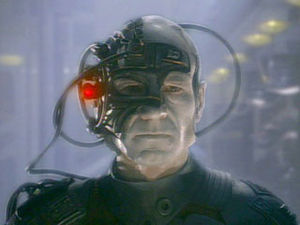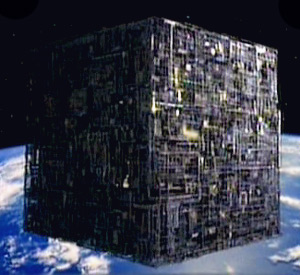Difference between revisions of "Borg"
| Line 9: | Line 9: | ||
While the Borg have acquired vast stores of knowledge from civilizations they have assimilated, they seem to have lost the ability to innovate. They now learn solely by assimilating knowledge from other races, doing no research or inventing of their own. This proved to be a devastating disadvantage when they faced a [[Species 8472|species]] that resisted their assimilation technology<ref>VOY "Scorpion"</ref>. | While the Borg have acquired vast stores of knowledge from civilizations they have assimilated, they seem to have lost the ability to innovate. They now learn solely by assimilating knowledge from other races, doing no research or inventing of their own. This proved to be a devastating disadvantage when they faced a [[Species 8472|species]] that resisted their assimilation technology<ref>VOY "Scorpion"</ref>. | ||
Borg drones and starships include shielding technology that allows them to resist attack from energy weapons. These defenses rely heavily on the ability to identify the [[frequency|frequencies]] of incident beams and [[Borg adaptation|adapt]] the shield to block those frequencies to the point that Starfleet [[hand phaser]]s are useless against them. Borg ships are highly adaptive, and they are able to quickly analyze effective methods of fighting them and make them useless.<ref>TNG " | Borg drones and starships include shielding technology that allows them to resist attack from energy weapons. These defenses rely heavily on the ability to identify the [[frequency|frequencies]] of incident beams and [[Borg adaptation|adapt]] the shield to block those frequencies to the point that Starfleet [[hand phaser]]s are useless against them. Borg ships are highly adaptive, and they are able to quickly analyze effective methods of fighting them and make them useless.<ref>TNG "Best of Both Worlds:</ref> | ||
==Territory== | ==Territory== | ||
Revision as of 02:34, 25 March 2010

The Borg are a society of cyborgs that control a large volume of space in the Delta Quadrant of the Milky Way galaxy in Star Trek. Originally conceived as a collective of "ultimate users" who would consume any useful technology they encountered, they were later re-invented as an expansionist regime that "assimilates" other species to acquire their technology, knowledge, and genetic material.
Organization
The Borg exist as a Collective in which all individuals are directly connected to a massive computer network via cybernetic implants. Although claims have been made that all Borg share collectively in Borg decision-making, individual "drones" in the Collective apparently have varying levels of authority, with the Borg Queen operating as the highest-ranking member and directing Borg policy. In this way, the Borg Collective resembles an insect hive, albeit one with problem-solving intelligence, advanced technology, and enormous resources.
Attributes
Although the Borg do reproduce to some extent (generating infants that begin receiving implants soon after birth)[1], the Borg population consists primarily of "drones" captured from other civilizations and forced to serve the Collective through a process called "assimilation". Fitted with cybernetic implants, these drones are physically much stronger than normal humans and have a variety of special abilities, such as replicating nutrients to sustain their organic components and surviving indefinitely in the vacuum of space. Borg drones communicate with each other via a constant stream of subspace transmissions[2], allowing the Collective to rapidly re-allocate resources in response to changing situations.
While the Borg have acquired vast stores of knowledge from civilizations they have assimilated, they seem to have lost the ability to innovate. They now learn solely by assimilating knowledge from other races, doing no research or inventing of their own. This proved to be a devastating disadvantage when they faced a species that resisted their assimilation technology[3].
Borg drones and starships include shielding technology that allows them to resist attack from energy weapons. These defenses rely heavily on the ability to identify the frequencies of incident beams and adapt the shield to block those frequencies to the point that Starfleet hand phasers are useless against them. Borg ships are highly adaptive, and they are able to quickly analyze effective methods of fighting them and make them useless.[4]
Territory
As of Star Trek: Voyager, Borg territory reportedly includes thousands of star systems. It would take an Intrepid-class Federation starship approximately two months to pass through their territory, presumably traveling the shortest available route at its best speed while avoiding contact[5].
Given Voyager's cruising speed of around 1000c, the "heart of Borg territory" would be roughly 167 light-years across. Presumably this was the most densely settled part of the Borg sphere of influence, as they were known to have a presence thousands of light-years from this particular area. It's also likely that the crew of Voyager was deliberately seeking to pass through Borg territory at the most narrow point they could find, so this particular description may not be a good indicator of the size of Borg territory.
Threat Assessment
The Borg are potentially the greatest single power in the Milky Way galaxy. The thousands of worlds under their control give them resources at least an order of magnitude greater than those of any of the major powers in the Alpha Quadrant, and their technology exceeds that of the vast majority of other Star Trek civilizations. Their interconnected nature allows the entire civilization to rapidly mobilize in response to a threat or opportunity. Borg vessels can sustain very high warp speeds for months, which enabled them to send a Borg Cube from the Delta Quadrant to the Alpha Quadrant in just over a year[6]. This cube easily defeated a fleet of forty Federation starships in battle.
The interconnected nature of the Collective can be a weakness, however; after Captain Picard was assimilated, the crew of the Enterprise was able to recapture him and use his connection to the cube to send its entire crew into "sleep" mode, triggering a self-destruct mechanism that destroyed the cube[7]. Similarly, the crew of the Enterprise developed an "invasive program" that, if deployed, might have crashed the Collective's entire computer network, effectively destroying their entire civilization[8].
Borg technology is known to be more advanced than that of the Federation in numerous fields, including propulsion (they have transwarp technology), shielding, power generation, and tractor beams.
Criticism
Despite their technological advantages, the Borg present a surprisingly low threat, as they repeatedly demonstrate tactical and strategic incompetence:
- While they possess the technology to make ranged energy weapons for drones, the Borg invariably send drones into combat armed only with nano-probe injectors that can only be used in hand-to-hand combat.
- Instead of detaining or assimilating any aliens that transport onto their ships, they frequently allow intruders to move about unmolested as long as they don't damage anything.[9]
- Even when facing opponents they know to be capable of destroying their ships with ease, they repeatedly broadcast a surrender demand before engaging in combat.[10]
- When a single cube failed to assimilate Earth, their strategy for a second attempt was to again send just one cube.[11]
It should be noted that the Borg weren't a big bunch of inept idiots when they first appeared in Star Trek: The Next Generation. To get a look how they were changed, check out Mike's Brain Bugs essay.

